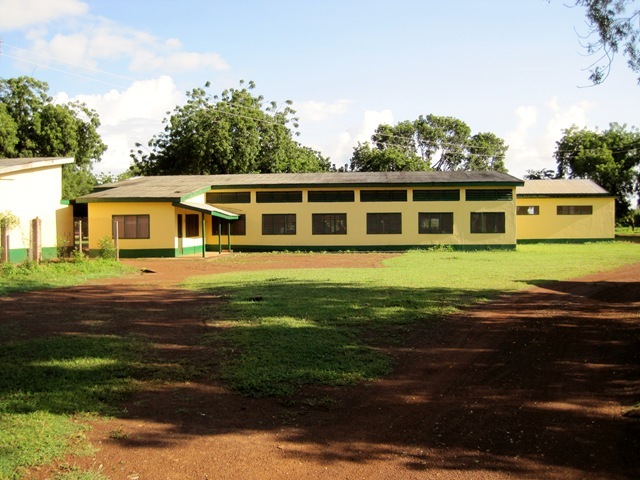Agriculture has proven to be the oldest and greatest back-bone to the economic development of Ghana. Undoubtedly, it is still the power-house of the country’s development. With the enormous contributions from the sector, past and current governments continue to draft and implement policies to help advance the sector’s role in the development of Ghana’s economy.
The sector’s contribution saw the establishment of Agricultural training colleges to train the frontline staff to man the dissemination of modern agricultural technologies to farmers to boost production in the country.
After the establishment of the agricultural colleges notably; Kwadaso and Ejura in the Ashanti Region, Damongo in the Savannah region, Animal Health and Production College, Pong-Tamale, Northern region and the Ohawu Agricultural College in the Volta region. These institutions have trained various categories of agriculture frontline staff in the agricultural development of Ghana. But the journey of training these staff for the sector has had its bit of challenges in realising the full purpose it was instituted.
To begin, Ohawu and Ejura colleges were established on the mandate to train young persons in the field of agriculture engineering, Kwadaso and Damongo for crops production training, and Pong at Tamale to train certified veterinary officers for the agriculture sector but the story behind the establishment is not the same as the story has changed with lack of infrastructure riding on the shoulders of these institutions.
To shorten the story, it responds to the position of resourcing the Agriculture College to adequately deliver their mandate rather than upgrading them into fully-fledged universities in Ghana.
In separate articles with stories from political parties manifestoes and promises notably from the camp of the National Democratic Party (NDC) and the New Patriotic Party (NPP) in their rallies to canvass vote in the December 7 general election, they come with the various political gimmicks to upgrade the Ohawu Agricultural College into the University of Agriculture and Agribusiness, the Animal Health, and Production College, Pong-Tamale into the University of Agriculture with focus on veterinary sciences. I called all these promises, “a vote to canvass stories from the electoral areas where the institutions are situated”.
The NDC as captured on page 40.6.9.7 b of the “The people’s Manifesto” has it to upgrade the famous OHAWU Agricultural College into a degree-awarding institution and would be named the University of Agriculture and Agribusiness if it wins the 2020 general elections. “The purpose of the upgrade and the establishment of the university are mainly to ensure that a lot of value is added to agriculture produce in the country”, said NDC”.
On the other, the Vice President of the Republic, Dr. Mohamadu Bawumia from the NPP government said to the chief and his subjects of Savelugu where the Animal Health and Production is situated that the college would be upgraded into a fully-fledged university when the NPP is given the second term at the office. As quoted from the VEEP’s speech delivered and sighted at graphic.com.gh, he said that the area where the college is located in an agrarian community and there is the need to upgrade the college to serve the inhabitants well… hmmm.
In a welcoming address to the President Nana Addo Danquah Akuffo-Addo during his visit to the Afife Traditional Council in Afife in the Volta Region, the paramount chief, Torgbui Adrakpannya VI reiterated the call and the need to upgrade the Ohawu Agriculture College within the traditional council into a fully-fledged university of agriculture.
“Upgrading the college into university would enhance the training of students to provide the needed human resource based in the agriculture sector, increase production, value addition to the farm produce, and sustain the interest of the youth in agriculture”, Torgbui Adrakpanya VI echoed.
All parties have good intentions for the agriculture sector but as a young agriculturist, the question I have been asking myself silently is that “what the various agriculture colleges in Ghana need to deliver its core mandate?”, my position is NO and I believe graduates of the various colleges would second my opinion. The agriculture colleges in the country have been neglected to the core and this has affected its mandate to deliver although it continues to trained staff to man the agriculture extension unit of the Ministry of Food and Agriculture.
The colleges are swimming in the pool of lack of infrastructure and other basic learning and training essentials. This is making the agriculture college system unattractive to recent second cycle school leavers which cause a sink to the good history of the institutions.
I would like to highlight some of the key challenges facing the various agriculture colleges and suggestions of remedies to salvage the sinking name of agriculture colleges in Ghana.
• Inadequate lecture: The agriculture colleges’ curriculum is a blend of field and classroom learning sessions but most of the colleges have inadequate classrooms to host learning sessions. In a situation where there are classrooms, the number of students is always above the capacity of the rooms. This is affecting the teaching and learning process at the colleges. Some lecture halls are without fans and proper lighting systems to aid learning. For instance, a lecture hall of Ohawu Agriculture College that was built for a thirty (30) students sitting capacity now accommodating over fifty (50) students, and this is a great hindrance to the training of this frontline staff at the Ministry of Food and Agriculture. It is important to construct more lecture halls to accommodate students for classroom sessions in the colleges.
• Lack of transportation facility: transportation systems in the various colleges are very poor and nothing good can be documented out of it. Agriculture studies are a blend of field and classroom learning and due to lack of transport, the means to commute from the campuses for fieldwork continue to impede the practical knowledge that students could have. To visit the field for practical knowledge sessions students have to pay and hire commercial buses to aid their studies on the field. Across the various colleges, all the buses on the campuses are grounded and not roadworthy to convey students off campuses. The provision of reliable transport systems can make a sound impact on the training life of trainees in the colleges. A big thanks to the Canadian government for donating buses to the various colleges to ease the difficulty in student transport.
• Inadequate residential facilities: accommodation is a huge problem in various colleges. The existing dormitories in the colleges were built to accommodate less than fifty (50) students but the situation is not as it supposed to be as the dormitories accommodate over seventy (70) students creating congestion. It is always my prayer that no communicable disease breaks out on the campus as both students, teaching, and non-teaching staff could be affected. It is important to begin building projects to salvage the lack the accommodation situations in the colleges.
• Lack of laboratories for practical lessons – agriculture is a science and learning science is facilitated by practical experiments but that is not the stories in the agriculture colleges. There are no laboratories for practical training and where there is a laboratory it is under-resourced to execute its duty. Everything in the colleges which are supposed to be practical is currently theoretical. This is affecting the inculcation of the deep understanding of the subject matter to the trainees. A college where chemistry, physics, soil science, and home science are learned with imaginations is the Agriculture College. Resource existing laboratories in the colleges and building of new ones where necessary is very important for the development of the students.
• Lack of agriculture machinery: the various colleges are the avenues for the trainees to gain basic skills in the operations of farm machinery and implements such as tractors, power tillers, tricycles, and other simple farm machines, but none of the colleges can boost functional farm machines for the training of students. All machines on the campuses are grounded and in a situation where machine services are needed private service providers have to be engaged of which is a dent in the college mission. A set of essential implements should be supplied to the colleges to aid in their practical training acquisition. This can help reduce the discouraging “manpi” – man labour use on the campuses.
• Lack of basic needs: basic needs like potable water and regular source of energy continue to be a problem riding on the success of the agriculture college training. Ohawu Agriculture College in particular lacks access to potable water for domestic use by the students. The only source of water is from the Vume Dam which is not well treated for human consumption. On energy, in a situation where the national power grid goes off the whole college would be in total darkness since there is no alternative power source. There is an inadequate human resource to aid the training of students in the various colleges.
• Lack of infirmary: none of the agriculture colleges has a sickbay that seeks the welfare of the populated trainees when an ill-health condition occurs. The whole community access healthcare needs from the neighbouring towns which affect better health delivering especially in the colleges in remote locations like Ohawu. Mini sick bays can be situated in the various campuses to enhance better healthcare for the college communities.
In an attempt to upgrade the Ohawu Agriculture College, as a product from the institution, I suggest that the various challenges hindering the conduct of skill training should be discussed and addressed to enhance favourable conditions for teaching and learning. The college is situated in close proximity to the defunct Crop and Soil Research Institute under the Council for Scientific and Industrial Research (CSIR) and the location of the Vume Dam which all provides an environment and potentials to make the college superior in the areas of field crop production, soil research activities, and irrigation facilities for economic gains to the college.
Ohawu Agricultural College needs resources to its full capacity in all areas that will make learning and training attractive to the second cycle school leavers and to live its core value and mandate.
I am of the view that the various colleges should not be upgraded to full-fledged universities from a political point of view but should be adequately resourced to deliver the mandate of training skillful frontline staff for the Ministry of Food and Agriculture and agriculture sector of Ghana.
There are much-unexploited potentials of the colleges and as a nation, we must avoid the cost of going to secure a loan to upgrade an institution that already has the ability to develop when well resourced.
My humble plea!
Long Live OAC
Long Live Ohawu Community
Long Live Vetco
Long Live Agric Colleges in Ghana.
Long Live Agriculture
Long Live Ghana
Written by: Abass Iddrisu
Initiator: Greeners Foundation Ghana||Nawun-Biya Agribusiness Management Consult.








